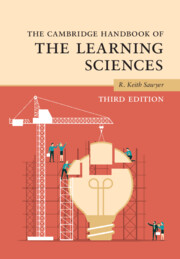Book contents
- The Cambridge Handbook of the Learning Sciences
- The Cambridge Handbook of the Learning Sciences
- Copyright page
- Contents
- Figures
- Tables
- Contributors
- Preface
- 1 An Introduction to the Learning Sciences
- Part I Foundations
- Part II Methodologies
- Part III Grounding Technology in the Learning Sciences
- Part IV Learning Together
- Part V Learning Disciplinary Knowledge
- Part VI Moving Learning Sciences Research into the Classroom
- 29 Learning as a Cultural Process
- 30 Designing for Meaningful Learning
- 31 Advances in Teacher Learning Research in the Learning Sciences
- 32 Learning Sciences and Policy
- 33 The Learning Sciences in the 2020s: Implications for Schools and Beyond
- Index
- References
29 - Learning as a Cultural Process
Achieving Equity through Diversity
from Part VI - Moving Learning Sciences Research into the Classroom
Published online by Cambridge University Press: 14 March 2022
- The Cambridge Handbook of the Learning Sciences
- The Cambridge Handbook of the Learning Sciences
- Copyright page
- Contents
- Figures
- Tables
- Contributors
- Preface
- 1 An Introduction to the Learning Sciences
- Part I Foundations
- Part II Methodologies
- Part III Grounding Technology in the Learning Sciences
- Part IV Learning Together
- Part V Learning Disciplinary Knowledge
- Part VI Moving Learning Sciences Research into the Classroom
- 29 Learning as a Cultural Process
- 30 Designing for Meaningful Learning
- 31 Advances in Teacher Learning Research in the Learning Sciences
- 32 Learning Sciences and Policy
- 33 The Learning Sciences in the 2020s: Implications for Schools and Beyond
- Index
- References
Summary
Learning and teaching are fundamentally cultural processes. Culture is the constellations of practices that communities have historically developed and dynamically shaped in order to accomplish the purposes they value, including the tools they use, the social networks with which they are connected, the ways they organize joint activity, and their ways of conceptualizing and engaging with the world. This chapter reviews research on the cultural nature of learning, including studies of (1) learning in and out of schools; (2) relationships between everyday and academic knowledge and discourse; (3) classroom-based design research that explores linkages between students’ diverse repertoires of practice and those of the academic disciplines being taught. This review addresses multiple dimensions of learning including cognition, discourse, affect, motivation, and identity. The research has implications for several issues in the learning sciences: How does learning interact with community practices? How can we connect these community practices to academic disciplinary practices? How can we use our understanding of community practices to support deeper learning?
Keywords
- Type
- Chapter
- Information
- The Cambridge Handbook of the Learning Sciences , pp. 581 - 601Publisher: Cambridge University PressPrint publication year: 2022

